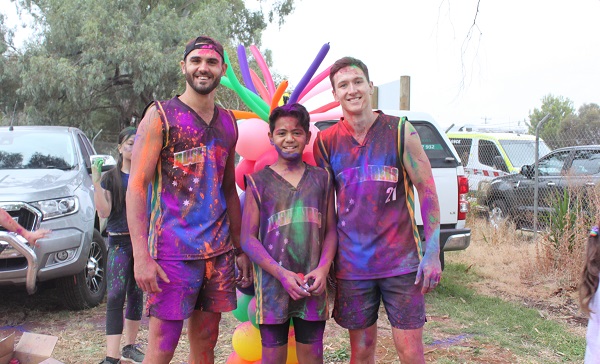
Fund amount:
$90,000 over three years
Program area:
Vulnerable Victorians
Location:
Loddon
Year:
2014
30 Mar 2019
A diverse and engaging program for students has resulted in an increase in Year 12 completion rates, consistently higher school attendance, and a clear preference for teenage Indigenous boys voluntarily joining the Clontarf Academy program at Robinvale ahead of other school options.
It is the relationships with strong male mentors, which is the key to the success of the Clontarf Academy program across Australia, according to Victorian Regional Manager, Charlie Shannon.
The program targets at-risk teenage Aboriginal male students who may otherwise have very low school attendance and provides them with an education and life skills program designed to ensure they complete Year 12 and obtain meaningful employment.
Having spent over 13 years with Clontarf in WA, the Northern Territory and now Victoria, Charlie says “we work hard to identify strong male mentors. These people are involved in the boys’ lives for long periods – we do everything to keep the boys on track from school pick-ups, breakfast, sports training, after school programs, camps… so it’s important that we get the right people.”
In Robinvale, the program involves two full-time, locally-based Clontarf staff mentors – Leon Johnson and Travis Bussell – who counsel the school’s 29 Aboriginal students on a range of behavioural, lifestyle and academic issues through a relationship-based program designed to engage and retain them in the education system.
When you read about the program, it’s enough to make you want to go back to school. Community participation is a strong component with Meals on Wheels, Clean Up Australia Day, the schools gardening program and the highly anticipated parents and community football game. High on the list of priorities are the health activities, which include cooking classes, mental health checks and Indigenous conflict resolution training, as well as camps, sport, employment – site visits to local employers – and work experience in the local community and further afield.
The family-like support both during and after school is crucial to the Academy’s success and one man knows this better than most from both sides of the fence. Using his own experience as the only Indigenous male to complete Year 12 at Robinvale College in a decade, Clontarf Academy Director, Leon Johnson, has a unique perspective with which to guide his young charges.
Leon was the first in his family to finish Year 12. He set a trend with his sisters and brothers and now he is passing it on to his students.
“It is so positive to see the boys doing the same thing and making that (finishing Year 12) their goal too.
“I can relate to them; we’re living in the same town, dealing with the same issues whether that’s to do with family or school.
“Year 9 and 10 are the high-risk ages. My friends left at Year 10 – there were a range of reasons from family, dropping out or wanting to get a job early – but I made it a goal to finish Year 12.
“These days there is a lot more support. There are more extracurricular activities, more help with health and employment.
“When I was at school there were Koori Education Support officers. They definitely helped me but I had to depend on building my own teacher and pupil relationships.”
Ross Trust funding over three years to the Clontarf program at Robinvale P-12 College is generating results that speak for themselves.
Since the Robinvale Clontarf Academy commenced in February 2010:
The welcoming and supportive program is also about creating confident young men who can look you in the eye and shake your hand, ready to take on the world.
Behind Clontarf’s mission sits the compelling story for Indigenous students in terms of the lifetime impact of successful school completion. The benefits to individuals, families and the broader Australian community of young Indigenous males completing school cannot be overstated.
An independent study has demonstrated that the work of the Clontarf Foundation does reduce the impacts on Australian society in terms of the health and justice systems, where unfortunately Indigenous men are over represented.
The report, from ACIL Allen Consulting shows on average, between the ages of 18 and 64, Clontarf males are 13 per cent more likely to be employed than non-Clontarf males.
Over his working lifetime, a male who has been to a school with a Clontarf Academy, will receive less in welfare payments, have less impact on the health and justice systems and pay more in income tax.
Charlie says “It is quite remarkable how school completion changes the outcomes on almost every measure… if an Indigenous young man completes year 12 and gets a job. If we can do something to help with that journey, it will be incredibly worthwhile.”
Another hallmark of the program seems to be the long-term relationships. “We have a strong alumnus, we work hard to stay in touch and we always encourage the boys to come back. Our employment team seeks to support the boys wherever they need it. If you’re a Clontarf alumnus, you can come back at any time and ask for help.
“You learn to be patient and compassionate (in this role) because change doesn’t happen overnight. You need to be pretty resilient; difficult, awful things can happen, and you know these boys pretty well, but that also means when things go well you get to celebrate the successes,” Charlie said.